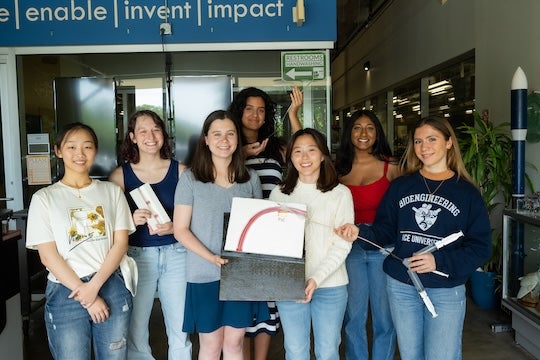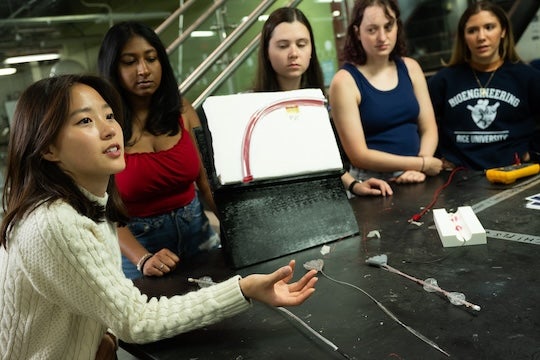Team Heartbeat HERoes claimed victory at Rice University's Oshman Engineering Design Kitchen's (OEDK) annual Huff OEDK Engineering Design Showcase last month. The team secured the 2024 Woods-Leazar Innovation Award along with a $5,000 cash prize for its project in medical engineering.

The students' Novel Alcohol Ablation Catheter with Electrical Signal Sensing project is a prototype for a novel catheter designed to treat premature ventricular contractions (PVCs), or irregular heartbeats originating in the ventricles of the heart. Frequent PVCs that are left untreated can lead to cardiomyopathy, a condition weakening the heart muscle.
Traditional treatment methods involve a complex surgical procedure known as alcohol ablation, which requires the use of three separate catheters. Team Heartbeat HERoes identified the shortcomings of this approach and set out to devise a more efficient solution.
The all-woman team included senior bioengineering majors Shannon McGill, Valentina "Vale" Ortega, Ananya Lingineni, Rachel Lee, Kate Mischlich and Jing Liu along with senior mechanical engineering major Veronica Aguilar. Together they developed a catheter equipped with a trio of stainless steel electrodes capable of sensing electrical signals from the heart's tissue.
The innovative design allows for precise targeting of abnormal heart tissue while sparing healthy cells, thus minimizing procedural complexity and improving patient outcomes.
"The current procedure for alcohol ablation is complicated for physicians to perform. They go in with three separate devices, and it's very complex and time-consuming," McGill said. "Our goal was to streamline the process and provide physicians with a single device that can effectively target and treat PVCs."
Ortega emphasized the collaborative effort behind their success. "We listened to each other, took everybody's input and worked as a team. Everyone was a puzzle piece, and we fit together well."

The engineering design event, formerly known as the George R. Brown Engineering Design Showcase, is a long-standing tradition for Rice engineering students at OEDK, Rice's premier undergraduate engineering makerspace.
"The showcase celebrates the hard work and hours spent designing and assembling their projects at the OEDK," said Sabia Abidi , bioengineering assistant teaching professor.
The team had several mentors from the Texas Heart Institute at Baylor St. Luke's Medical Center, including Mathews John, engineering program manager of electrophysiology clinical research and innovations, Allison Post, Dr. Michael Tan and Dr. Mehdi Razavi.
"The students displayed ingenuity and teamwork with their innovative project," Razavi said.
This year's competition, held at the Ion innovation hub in Houston's Midtown neighborhood, saw 68 teams compete. The judges were industry and medical professionals, many of them Rice engineering alumni. Winning teams took home a combined total of more than $19,000 in cash prizes.
Director Maria Oden highlighted the significance of OEDK in nurturing innovation among students, supporting the work of over 900 students and at least 20 courses this academic year.
"Team Heartbeat HERoes secured a well-deserved victory and also paved the way for advancements in cardiac care that could benefit countless individuals worldwide," Oden said.






